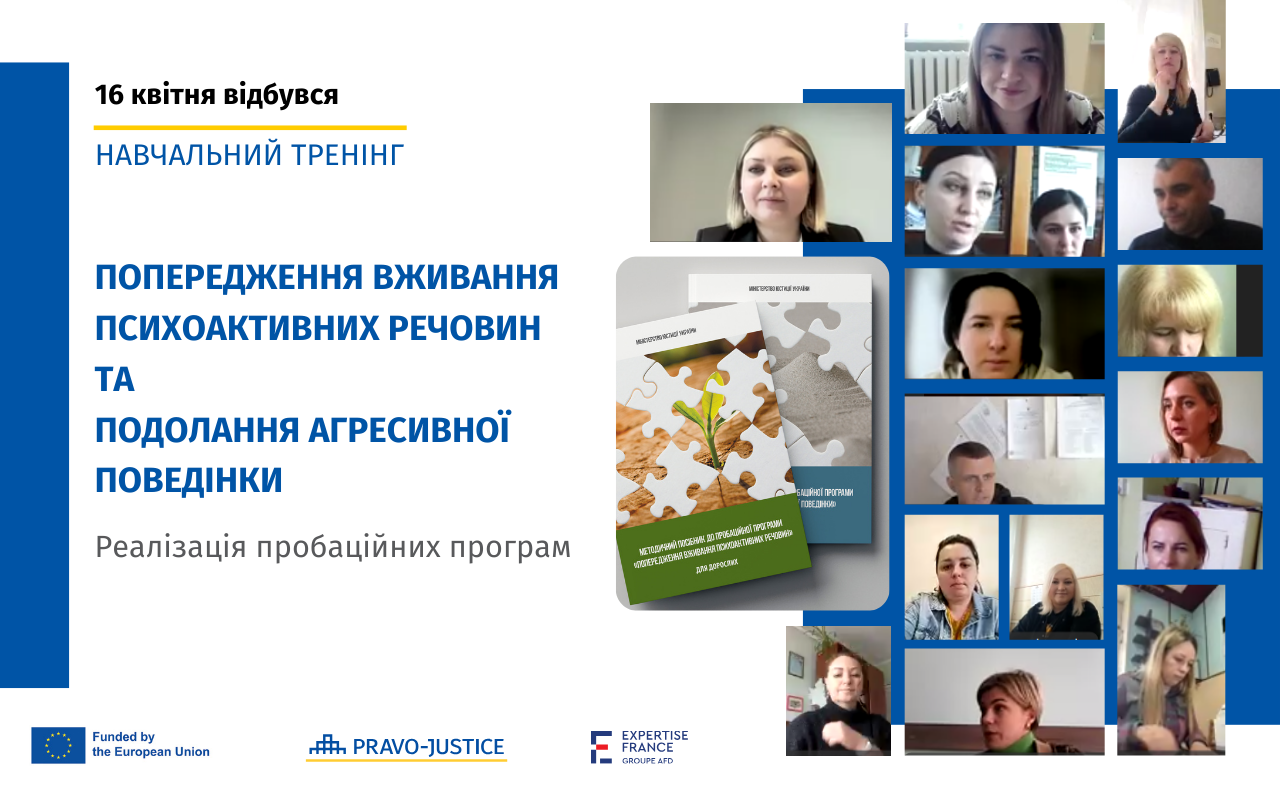EU Project Pravo-Justice Conducted Training on Implementation of Probation Programmes "Preventing Substance Abuse" and "Overcoming Aggressive Behaviour"

On 16 April 2025, at the request of the State Institution “Probation Centre”, EU Project Pravo-Justice conducted a training session on the implementation of 2 probation programmes: “Preventing Substance Abuse” and “Overcoming Aggressive Behaviour”. More than 450 probation officers from all over the country who supervise the implementation of these programmes participated in the event.
This webinar was the second training session in a series of events organised by EU Project Pravo-Justice experts to improve the professional capacity of probation officers to enhance their ability to effectively implement probation programmes. The first webinar, which took place on 9 April, was dedicated to the practical aspects of implementing the programme “Changing the Pro-Criminal Mindset”.
“Such webinars are essential for supporting the professional capacity of probation officers, especially given the high staff turnover rate. In order for to implement probation programmes that combine a mandatory element the probation client must fulfil under a court decision with a psychological and educational component based on cognitive and behavioural approaches, the staff must have a clear understanding of their logic and delivery methodology,” said Olena Subotenko, Deputy Director of the State Institution “Probation Centre”.
She noted that even though probation officers may not be well-versed in psychotherapy, they can effectively implement programmes if they are provided with high-quality manuals and systematically trained.
“The success of the programmes largely depends on the supervisors’ training level and their ability to properly apply approaches tailored to clients’ needs. Therefore, regular training is not only advisable, but imperative to ensure the sustainability of probation programmes,” added Olena Subotenko.
In her turn, Olena Kochura, Key Expert on Reforming the Penitentiary System and Probation of EU Project Pravo-Justice, said that probation programmes are one of the most effective tools for shaping long-term law-abiding and pro-social behaviour, which has been proven efficient in many European countries.
“The effective implementation of probation programmes is an integral part of our European integration track. In this context, training for probation officers, particularly through regular webinars, has a key role to play. This is an opportunity for probation officers not only to acquire new knowledge, but also to build a shared understanding of the methods, goals and approaches to programme implementation. Probation staff must be confident that they will be able to influence the clients’ behaviour – not only in the short term, but also with a focus on long-term mindset changes,” said Olena Kochura.
Moreover, the expert emphasised that EU Project Pravo-Justice will further support the development of Ukrainian probation as a system committed to humanity, efficiency and relevance.
“Training events such as this webinar bring us closer to our shared goal of creating a probation system in line with the European standards in Ukraine,” added Olena Kochura.
Nataliia Stroieva, a national expert of EU Project Pravo-Justice, emphasised that the training curriculum was designed to meet probation officers’ real needs and requests arising throughout their daily implementation of probation programmes.
“We have thoroughly analysed the typical questions and challenges faced by local programme supervisors, and this served as the basis for developing practical solutions, reliable tools and real-life cases. We especially focused on the practical aspect of the training: how to effectively implement probation programmes when working with clients, how to tailor the approach to individual circumstances, and how to empower real changes in probation clients’ behaviour,” said Nataliia Stroieva.
After completing the training, the participants noted that the course provided not only valuable theoretical guidance, but also practical tools that would improve their ability to engage with probation clients in real-life situations. They especially appreciated the trainers’ advice on how to work with the probation clients’ resistance and facilitate a more conscious pursuit of the goals of probation programmes. Some trainees also noted that they reflected on the potential of these programmes and discovered new ways to effectively implement them.
In May, EU Project Pravo-Justice experts plan to hold another webinar dedicated to the probation programmes “Building Life Skills” and “Overcoming Domestic Violence”.
Reference
Probation programmes are effective tools for changing convicts’ thinking and behaviour through the principles of cognitive and behavioural therapy. They have been gradually introduced in Ukraine since 2018. Their implementation is mandatory under a court order and they combine elements of a legal obligation with a powerful rehabilitation component.
Currently, probation authorities in Ukraine are implementing five programmes:
- Changing the Pro-Criminal Mindset.
- Preventing Substance Abuse.
- Overcoming Aggressive Behaviour.
- Building Life Skills.
- Overcoming Domestic Violence.